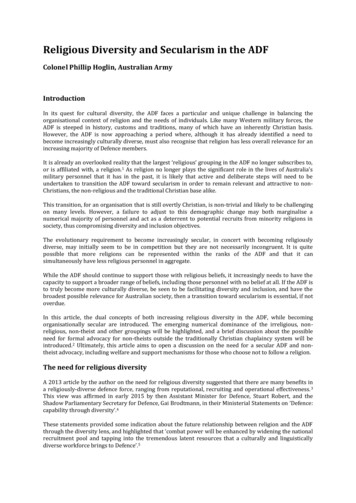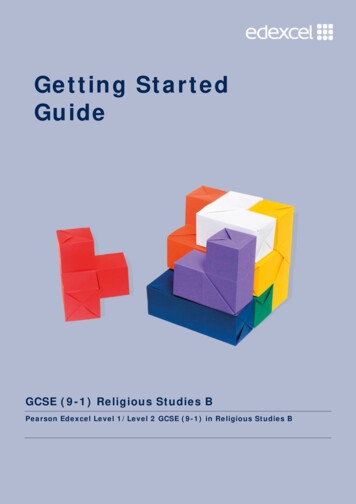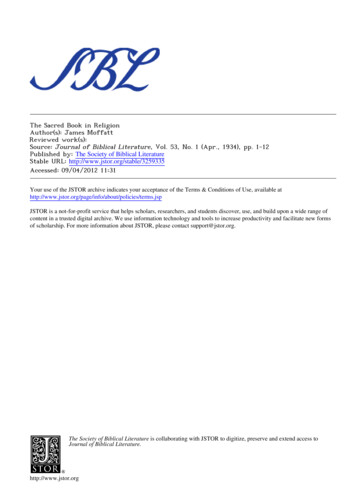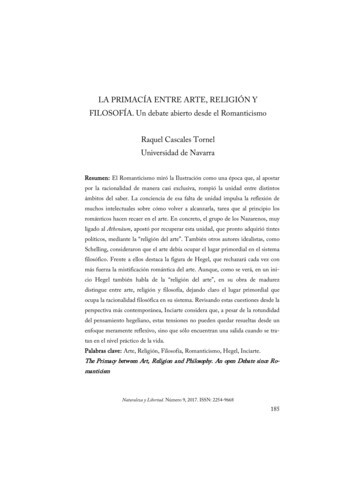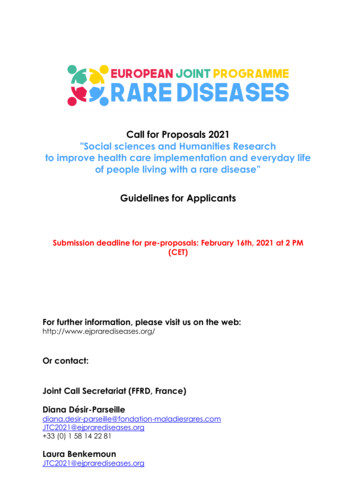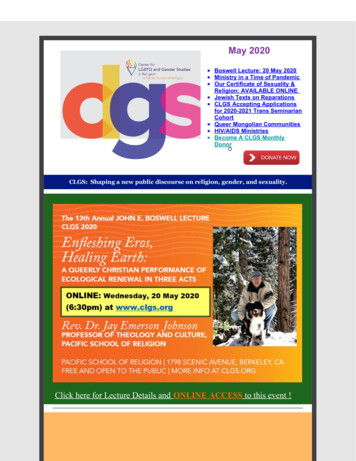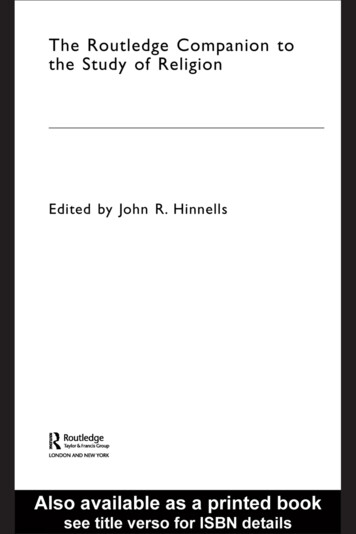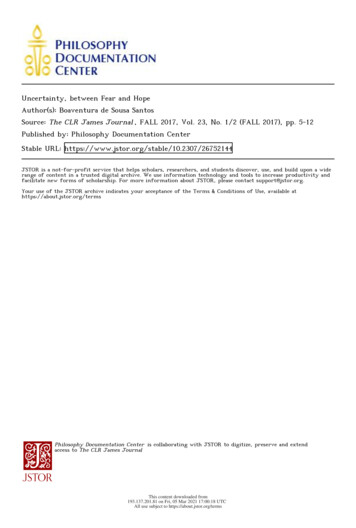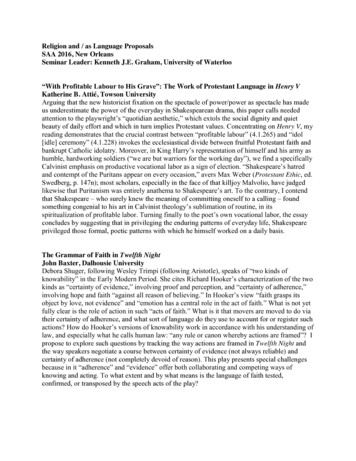
Transcription
Religion and / as Language ProposalsSAA 2016, New OrleansSeminar Leader: Kenneth J.E. Graham, University of Waterloo“With Profitable Labour to His Grave”: The Work of Protestant Language in Henry VKatherine B. Attié, Towson UniversityArguing that the new historicist fixation on the spectacle of power/power as spectacle has madeus underestimate the power of the everyday in Shakespearean drama, this paper calls neededattention to the playwright’s “quotidian aesthetic,” which extols the social dignity and quietbeauty of daily effort and which in turn implies Protestant values. Concentrating on Henry V, myreading demonstrates that the crucial contrast between “profitable labour” (4.1.265) and “idol[idle] ceremony” (4.1.228) invokes the ecclesiastical divide between fruitful Protestant faith andbankrupt Catholic idolatry. Moreover, in King Harry’s representation of himself and his army ashumble, hardworking soldiers (“we are but warriors for the working day”), we find a specificallyCalvinist emphasis on productive vocational labor as a sign of election. “Shakespeare’s hatredand contempt of the Puritans appear on every occasion,” avers Max Weber (Protestant Ethic, ed.Swedberg, p. 147n); most scholars, especially in the face of that killjoy Malvolio, have judgedlikewise that Puritanism was entirely anathema to Shakespeare’s art. To the contrary, I contendthat Shakespeare – who surely knew the meaning of committing oneself to a calling – foundsomething congenial to his art in Calvinist theology’s sublimation of routine, in itsspiritualization of profitable labor. Turning finally to the poet’s own vocational labor, the essayconcludes by suggesting that in privileging the enduring patterns of everyday life, Shakespeareprivileged those formal, poetic patterns with which he himself worked on a daily basis.The Grammar of Faith in Twelfth NightJohn Baxter, Dalhousie UniversityDebora Shuger, following Wesley Trimpi (following Aristotle), speaks of “two kinds ofknowability” in the Early Modern Period. She cites Richard Hooker’s characterization of the twokinds as “certainty of evidence,” involving proof and perception, and “certainty of adherence,”involving hope and faith “against all reason of believing.” In Hooker’s view “faith grasps itsobject by love, not evidence” and “emotion has a central role in the act of faith.” What is not yetfully clear is the role of action in such “acts of faith.” What is it that movers are moved to do viatheir certainty of adherence, and what sort of language do they use to account for or register suchactions? How do Hooker’s versions of knowability work in accordance with his understanding oflaw, and especially what he calls human law: “any rule or canon whereby actions are framed”? Ipropose to explore such questions by tracking the way actions are framed in Twelfth Night andthe way speakers negotiate a course between certainty of evidence (not always reliable) andcertainty of adherence (not completely devoid of reason). This play presents special challengesbecause in it “adherence” and “evidence” offer both collaborating and competing ways ofknowing and acting. To what extent and by what means is the language of faith tested,confirmed, or transposed by the speech acts of the play?
Religion and /as Language Proposals 2Hendiadys and Interpretation in Anne Lock’s MeditationGabriel Bloomfield, Columbia UniversityAnne Lock’s Meditations of a Penitent Sinner have not often been subjected to close rhetoricalanalysis. Critics have typically preferred to locate this psalm translation as a node in literaryhistory: as a founding document of “Puritan poetics”;; as the first sonnet sequence in English;; andas the earliest English example of a verse-by-verse poetic gloss on a scriptural text.Concomitantly, Lock’s verse is found to be “unoriginal, [ ] stalling, indecisive, circular, [ ]scrambled,” a repetitive heap that would seem unlikely to yield interesting results if placed underthe microscope of close reading. This paper seeks to undo some of these critical truisms byexamining the figure of hendiadys in Lock’s sonnets. Hendiadys, I argue, (the figure of “onethrough-two”), figures the proliferation and “increase” of sin and horror in the Psalmist’s textwhile simultaneously marking the moments of Lock’s paraphrase where she strugglingly andself-consciously departs from the literal sense of the scripture she is adapting. I contextualizethese hendiadic structures as examples of expolitio, the classical figure of simultaneous dilationand polishing. In these expolitory moments, Lock generates brief but striking exegeses of hersource text, Psalm 51. My paper therefore suggests new perspectives on the sequence’srelationship to the text it accompanies (Lock’s translations of Calvin’s sermons) and the semiforgotten history of the trope of hendiadys.Our Fangled World: Freedom and Prophetic Speech in CymbelineClaire Falck, Rowan UniversityMy paper analyzes the prophetic tablet in Cymbeline as an instrument of the play’s paradoxicalstrategy to enable free individual choice and communal restoration through rhetorical andtemporal over-determination. Although Cymbeline is celebrated for its luxuriant excesses,perhaps no single object better encapsulates the play’s generous redundancy than Posthumus’sprophetic tablet. This gift, given to him in his sleep by his ghostly family at the “great behest”(5.3.186) of Jupiter, is ostentatiously unnecessary from the moment it appears. Couched inlanguage so obscure that Posthumus despairs of deciphering it, he promptly forgets about it untilthe play’s end. After the emotional enormity of the last scene’s revelations and reconciliations,the Roman soothsayer’s post-mortem construction of the tablet as prophesizing everything wejust witnessed is distinctly anti-climactic. In an era acutely conscious of the spiritual potency andpitfalls of prophetic speech, such a prophecy may appear just one more ornamental flourish inwhat Posthumus describes as Cymbeline’s “fangled world” (5.3.198). However, I propose thatthe prophetic tablet demonstrates how, in Cymbeline, it is the excesses, ambiguities andredundancies of language that create the space for the free actions of confession, revelation, andpardon that characterize the play’s final movement. No one is constrained by the tablet’sprophetic speech, but its presence as an legible sign of Jupiter’s illegible providential plotting iswhat empowers the characters to enact their providence and peace, and bring “a speaking such /As sense cannot untie” into “sympathy” with the actions of life (5.3.210-214).
Religion and /as Language Proposals 3Twelfth Night: The Clown and the Prayer BookGayle Gaskill, St. Catherine UniversityIn Twelfth Night, the Clown repeatedly and comically appropriates the manner of a parson byechoing the familiar 1559 Book of Common Prayer, the authorized Anglican liturgies ofcommunal worship. Initially his gentle parody of the Confirmation office leads Olivia to leavemourning for her dead brother long enough to smile in her conviction—bolstered by the BurialOffice--of his place in heaven. Further catechistical dialogues develop in Olivia’s first lovestruck conversation with Cesario and climax in the twins’ dramatically piecemeal, seeminglymiraculous revelation of their identities. Meanwhile, as he delivers Malvolio from imprisonmentfor insanity, the Clown attempts to minimize the practical joke with a comic reference to theorder of service for the Lord’s Supper: “But as a madman’s epistles are no gospels, so it skillsnot much when they are delivered.” When the Clown starts to play a Parson in a clerical gown,however, and visits Malvolio in his dark house with phrases from the prayer book’s Order for theVisitation of the Sick, he quickly abandons the text for an improvisational exorcism and theprayer book’s language of forgiveness and communal reconciliation recedes into the isolatingtaunts of reciprocal revenge.Shakespeare’s Language of Botched RepentanceJonathan Goossen, Ambrose UniversityShakespeare seems to have had Hamlet still in mind when, several years later, he was penningMeasure for Measure. Angelo’s anguished considerations of temptation and the results ofsuccumbing to it strongly recall Claudius’s equally haunted deliberation over his crime and thepossibility of repenting it. In attempting to extricate themselves from sin (whether contemplatedor committed), both characters employ the theological language of “guilt,” “will,” and “grace” todiagnose with striking verbal precision and moral clarity the nature of that sin. Yet despite theiracute perceptions, neither character can bring himself to repent. In keeping with the theme of“seeming” crucial to both plays, Angelo and Claudius figure their problem as an inability to uniteoutward words with inward intentions in prayer: as Claudius concludes, “My words fly up, mythoughts remain below.” The diction and scenarios of their soliloquys, then, invite considerationof Shakespeare’s perennial interest in the relationship of action to intention from the perspectiveof a theology of repentance. This paper draws on recent critical studies of early modernconfession, repentance, and forgiveness to identify what intervenes between Angelo’s andClaudius’s knowledge, intentions, and actions to botch their attempted repentance.
Religion and /as Language Proposals 4The Poetics of Asceticism: Word and Meaning as Body and SoulPatrick McGrath, Southern Illinois UniversityThis paper engages the seminar’s theme—“Religion and/as Language”—by considering how adevotional mode (asceticism) had linguistic and literary consequence in early modern England.Asceticism is one attitude towards the relationship between the body and soul; it seeks to purgethe soul of sinful carnality. After the Reformation, the traditional forms of ascetic life—monasticism, virginity, corporal mortification—were variously rejected, reformed, andreinvented. They were revised with this question in mind: Was asceticism primarily a spiritualor physical process? If the end of asceticism was spiritual, then shouldn’t the means to achieve itbe similarly spiritualist? Isn’t that precisely what Roman Catholic asceticism got wrong? Andyet, a purely spiritual emphasis ran up against the paradox of embodiment, of fallen bodies: thebody was both the thing superseded and the means of supersession; pervasive, insidious carnalitymade the body an unavoidable ascetic partner. As a result, a tension emerged between spiritualand physical modes of asceticism in early modern England.Enter literature.How literature negotiates the relation between word and meaning, form and content,recapitulates the central problem of asceticism. What is, and what should be, the relationshipbetween the body and the soul, and how to go about achieving it? The literary applicability ofthat relationship is based on an analogy—found in scriptural exegetes from Augustine toErasmus and many early modern literary texts—equating words with the body and theirmeanings with the soul. Should signs (body) be disregarded for the signified (soul) they contain?Is a concentration of meaning/content achieved through—or in spite of—form? I explore thesequestions by examining the plain and metaphysical styles in the work of Andrew Marvell, JohnMilton, and Abiezer Coppe. How these styles treat their linguistic raw materials adumbrates atension that defines asceticism in early modern England.Rhetorical Fooling and Theological Parody in Hamlet 5.1Lee Oser, College of the Holy CrossMy premise is that the author of Hamlet appreciated the power of Erasmus’s debate with Lutherover free will. Neither the historic magnitude of this debate, nor its connection to otherinfluential writings (in More, for instance), has been sufficiently acknowledged by the play’slegion of critics. Given how deeply the problem of free will enters into Hamlet’s dialogue andimagery, we may deduce that, for Shakespeare, the traditional moral purpose of drama itself wasat stake in the Luther’s rejection of free will. What moral impact, after all, could a play have onan audience whose souls were already spoken for?And yet, despite his late-Reformation (not post-Reformation) consciousness of how the“bondage of the will” would nullify the moral aspirations of literature, Shakespeare refused tochampion the Catholic Erasmus, the Protestant Luther, or their proxies. HighlightingShakespeare’s rhetorical art, I suggest that, through his clownish gravediggers, Shakespeare usesrhetorical vices—what we would today class broadly as “Malapropisms”— figures of speech thatreveal a speaker’s ignorant misapplication of a word, or, more interestingly, his or her punningand dexterous ambiguity, in order to avoid resolving crucial theological questions. I propose thatShakespeare subjects these religious cruxes to a high order of serious parody. In my view, thedizzying alternation of Protestant and Catholic ritual and sensibility, among the remains ofYorick and Ophelia, serves Shakespeare’s moral argument for religious tolerance.
Religion and /as Language Proposals 5Redefining “Error”: The Admonition Controversy and Shakespeare’s The Comedy ofErrorsMarsha S. Robinson, Kean UniversityThe conflict over disciplinary reform which troubled the Church of England from the 1570s tothe early 1590s was styled by establishment spokesman Archbishop John Whitgift, as a“persecution of the tongue.” Like all controversies it featured a constellation of recycled wordswhich would have been familiar to readers, sermon-goers and a weary and alienated public.Chief among these words is the word “error.” This word not only repeatedly appears in the workof controversialists, but determines the very structure of their discourse. The reformers’ bitteraccusations of doctrinal error are countered by conformist replies which exhaustively refute eacherror and launch scathing counter-charges. In 1593 both conformist theologian Richard Hookerin his Of the Laws of Ecclesiastical Polity and dramatist William Shakespeare in his The Comedyof Errors engage in this national debate. Both writers shift the conversation about “error.”Writing as an establishment polemicist, Hooker hopes to persuade the presbyterian reformers of“the error” of their platform for church polity; however, his analysis moves inward beyond“error” as a proposition which deviates from truth to an examination of error as subjectivity.Shakespeare too re-frames the controversy over “error.” Giving doctrinal error “a localhabitation and a name” (evoked by the biblical Ephesus), he farcically reduces theological errorto Plautus’ mistaken identities. And like Hooker he portrays error as endemic to the fallencondition of humankind.“Shall’s have a play of this?” Heresy and Adultery in Shakespeare’s CymbelineKilian Schindler, University of FribourgIn this paper, I will examine the language in which Shakespeare addresses questions of heresyand religious conflict. Early modern writers on those subjects had a number of conventionalisedmetaphors for heresy at their disposal, such as disease, counterfeiting, or adultery. Despite suchconventionalisation, however, the semantic imprecision of figurative language resulting from thediscrepancy between tenor and vehicle provided individual writers with a considerable space oflinguistic freedom to manipulate the inferences to be made from a given conventionalcomparison or metaphor. As I shall argue, such figurative language therefore permits, despite itsmostly negative connotations, to change perspectives on heresy and to formulate a plea fortoleration.As I intend to demonstrate with a brief survey of the early modern use of the metaphor ofadultery for heresy, writers in various genres did indeed employ it in order to back up asurprisingly wide range of theological agendas and positions on persecution and toleration. AlsoShakespeare was not oblivious to this kind language usage in Cymbeline. By contextualisingShakespeare’s figurative language in the theological discourses of his time, I thus hope to showthat Cymbeline is not without religious implications. On the contrary, the play can be seen toentail a forceful critique of religious persecution in its remarkably lenient treatment of adulteryas well as its stress on forgiveness and the dangers of misrecognition.
Religion and /as Language Proposals 6Shakespeare and Private PrayerCeri Sullivan, Cardiff UniversityLiterary critics may yawn at the mention of prayer: how could it ever be free to argue, sowdoubt, be ironic, experiment with form, or be playful? But at the turn of the seventeenth centuryprayer collections celebrated it as a vital force, freeing social energies by its elevated energy andexcitement, prophetic of what should be and could be. Whether best-sellers or one-off pieces,across doctrinal positions, regardless of the rank or vocation of their intended readers, thesecollections were uncharacteristically unanimous: for the first time ever, all lay people wereexpected to compose their own prayers, in their own language, about the urgent issues in theircommunity. There is an explicitly dramatic aspect to private prayer, which is clarified whenprayers are written for the stage. Research questions include:·How did developing conceptual frameworks of prayer and creativity converge, especiallyover how preparation yielded to improvisation?·What was the artistry needed in putting up a prayer for another person? Conversely, didstriking situations in the prayer collections make it onto stage?·What were the imaginative possibilities offered by focusing on ‘what ifs’? Reversing this,did staged prayer illuminate alternative plot-lines and options open to a character?·Did advice on alternating acting and reviewing in prayer respond to the evolvingtechnique of soliloquising? Can such advice suggest how a player might act this form? Or how awritten form (prayer or player’s part) was spoken?·What is the ‘hot dynamic’ between pray-ing actor and audience?The Poetics of Faith: George Herbert and the Failures of ArticulationAmber True, Michigan State UniversityChristian theology makes a clear distinction between the religious phenomena of faith and belief,a distinction that appears in the earliest Christian writings and persists into the early modernperiod (and beyond). To draw a rather simplistic analogy, we can compare this distinction to theprocess of reasoning: faith is the premise(s) from which belief is drawn. Faith, as Debora Shugernotes in “The Philosophical Foundations of Sacred Rhetoric,” is trust. It is a state of being – afull acceptance of one’s relationship with God. Belief, on the other hand, is the set of conclusionsand practices drawn from faith. As such, literary representations of belief are extremely common.But representations of faith are not nearly so common, mainly due to the inherent inarticulabilityof faith.This paper explores the problem of representing faith as such in lyric poetry, with a focuson George Herbert’s poem “Faith.” Herbert’s poetry is steeped in representations of belief,particularly the material nature of belief. But “Faith” suggests a different kind of exploration, onewhich demonstrates the bounds of language to convey this religious phenomenon, the singularphenomenon at the root of the Christian experience. Herbert’s struggle to represent faith pointsto a deeper problem with his own role within the church and with organized Christianity, that ifneither direct nor figurative language can convey faith, what capacity does theology or theChurch have to do the same?
Religion and /as Language Proposals 7On “the Host”Margaret Tudeau-Clayton, University of NeuchatelThis paper examines a neglected, though highly charged instance of what Sarah Beckwithdescribes as the ‘revolution’ in religious language that takes place in the English Reformation:the erasure of the word ‘Host’ from the sacred lexicon. The word is explicitly rejected as ‘papist’in protestant attacks on ‘the Mass’ — another explicitly rejected word — and implicitly rejectedin mocking citations of ‘papist’ practices. The most telling evidence, however, is the absence ofthe word from the language used of, and in the rite of ‘the Lord’s Supper’ (as ‘the Mass’ wasrenamed), in The Book of Common Prayer. Two reasons for this erasure emerge: first, ‘the Host’is associated with the idea of sacrifice carried in the Latin hostia from which this sense of theword form derives (OED ‘host’ n. 4);; second, its lexical particularity underscores the substantial‘real’ difference of the consecrated bread. Within this context two very different texts, chargedwith this lexical event, are shown to acquire fresh significance: a scene of reconciliation inWilliam Shakespeare’s comedy The Merry Wives of Windsor in which the figure of the Host ofthe Inn is associated with the trans-national integrative function carried by the spectacle of ‘theHost’, and George Herbert’s religious lyric ‘Love (III)’, which stages a scene of the Lord’sSupper in which ‘the Host’ is a present-absent sign of ‘the superstition’, as the 1552 version ofThe Book of Common Prayer puts it, which has been erased in the reformed rite. In both texts theevocation of this present-absence depends on the polyvalence of the English word form, notablythe sense, derived from the Latin hospes, of one who houses another (OED ‘host’ n. 2).Interestingly – and perhaps significantly — the two senses are exploited by the Catholic WilliamReynolds in a mocking riposte (1593) to the denial of the substantial –‘real’- difference of theconsecrated host in the published sermons of the Presbyterian Robert Bruce (1591).The Political and Dramatic Possibilities of Religious Rhetoric in Henry VDenis Yarow, University of TorontoWhen the disguised Henry, speaking on his own behalf in Act 4, Scene 1, defends the king’scause as “just” and his quarrel as “honourable,” his soldiers instantly deny the certitude of hisclaims: “That’s more than we know,” Williams declares, a statement qualified by Bates’conciliatory “Ay, or more than we should seek after.” Henry refuses to engage the implicationsof Williams’ epistemological inflection of their debate on the ethics of war, absolving himselfinstead of any responsibility for his soldiers’ fates by arguing that each is answerable to Godwithout royal mediation. In this paper, I take up Williams’ challenge in order to investigate thepolitical and dramatic uses of religious rhetoric in the play. From its beginning, Henry V isinfused with epistemological anxieties over the legitimacy of the war effort, the legacy ofusurpation, and the limits of sovereign authority, with religious language mobilized in eachinstance as the primary mode of (self-) persuasion. However effective the rhetorical power ofsuch language may be in the maintenance of social hierarchies (granting Henry legitimacy overhis subjects), its inherent, universalizing doctrinal impulses unsettle any strictures, yielding ahighly generative tension that propels the play’s action. My aim in this paper will be to trace thedynamics of that tension as encoded in the relationship between the play’s dramatic action andform and the rhetorical material of its text in an effort to develop strategies for conceiving of areligious rhetoric unique to the theatre of early modern England.
Religion and /as Language Proposals 3 Twelfth Night: The Clown and the Prayer Book Gayle Gaskill, St. Catherine University In Twelfth Night, the Clown repeatedly and comically appropriates the manner of a parson by echoing the familiar 1559 Book of Common Prayer, the authorized Anglican liturgies of
